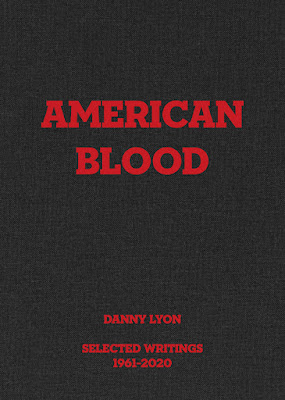 |
| ISBN: 978-1-949172-45-4 |
Before reading Danny Lyon's "American Blood," I knew very little of this iconic photographer. I knew of his book "The Bikeriders" and that he is work-wise associated with Robert Frank's photographs and may be similar to Larry Clark, with respect to his "Tulsa." Like the other two, he is a photographer who captured a form of life in front of his camera lens. I also knew that he was very much an activist and involved in the Civil Rights Movement. Beyond that, he was a ghost to me. Every once in a while, a book would appear, but I sensed that he was a photographer/journalist who didn't compromise when it comes to his work. So in that sense, he reminded me of Frank and Clark. What I really didn't know is that Danny Lyon is a writer of great worth.
Reading "American Blood" is like peeling an onion. The more I read these essays, interviews, and various writings, the more I get a sense of his character. When I read the first few essays, he struck me as someone who is not humorous and took things in life very seriously. One of the photographs in the book is the first photo he has ever taken. It's an image from Dachau, Hitler's first concentration camp, and it of a tree where the Nazis had taken Jews to be shot. A lot of the book deals with his time and thoughts on American prisons. Here was an artist who spent a great deal of time recording and acknowledging the horrors on this planet.
At first, it was a bit too much for me. Still, I couldn't put the book down due to Lyon's character as well as his writing which I found beautiful because he avoids the easy answer or knuckle-head response to issues that were and still are important in American society. As one reads on, his world expands, and as a reader, you're going on the ride with him. His observant writing and stance make him unique because he articulates so well. He nails the prison system for what it is, an exploration factory and a landscape that is a world within a world. Lyon accepts people as if they are, not as he thinks they should be. His moral hatred for those in power and exploitation is apparent on these pages. As a photographer, it's interesting to acknowledge the difference between the digital and analog world. He doesn't like digital, but as the book goes on, he accepts certain aspects of that environment. For social justice, he acknowledges using a phone camera where one can capture a moment of distress or injustice, not just by one photographer. Lyon is the generation of the fellow who carries a heavy camera with him and deals with obtaining film, developing, having a darkroom, and the pros and cons of it. This is not a manual on how to take images. But more of a point-of-a-view of a creative soul who cares deeply about the world around him. Lyon cares about photography as an art and as a manner to explore one's world and record the injustices that take place around the planet. In such a way, Danny Lyon is very much a romantic adventurer.






.jpg)














No comments:
Post a Comment